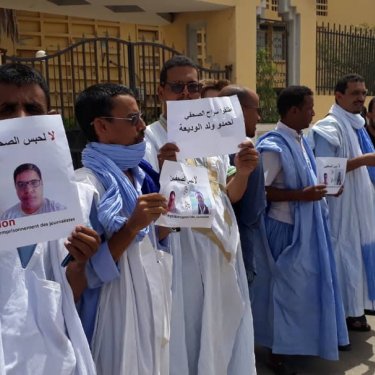Mauritania still violating press freedom after restoring Internet

The Mauritanian authorities have finally restored the Internet access they disconnected one day after the 22 June presidential election, but Reporters Without Borders (RSF) urges them to stop intimidating the most critical journalists and, in particular, to free an outspoken TV presenter held since 3 July.
Ahmedou Ould Wediaa, a journalist with the Mauritanian TV channel Al-Mourabitoune who is well known for his virulent criticism of outgoing President Mohamed Ould Abdel Aziz, was arrested at his Nouakchott home of the evening of 3 July. The authorities have provided no information about his arrest.
"We fear that this is yet another arrest that amounts to intimidation,” one of his colleagues told RSF.
Another journalist known for criticizing the government, Camara Seydi Moussa, had just been released on 3 July after being held for a week. RSF has learned that the state security agents who arrested Moussa at his home, seizing all of the mobile phones and laptops there, accused him of disputing the election results during phone conversations, suggesting that his calls had been tapped.
Moussa’s release came at the same moment that the authorities restored Internet access, ending 11 consecutive days without any Internet connection, several sources told RSF.
“Restoring the Internet is good news, but the many press freedom violations are helping to sustain a climate of fear for anyone questioning the position taken by the authorities since the disputed presidential election,” said Arnaud Froger, the head of RSF’s Africa desk. “We urge the authorities to free the journalist still being held, to end the violations of the confidentiality of sources by the security services, and to resort to no further Internet cuts. Such methods are a million miles from the democratic transfer of power from one elected president to another that the authorities say they want to achieve.”
Journalist in the government’s sights
Around 30 Mauritanian journalists staged a sit-in yesterday to demand Wediaa’s release. This is not Wediaa’s first run-in with the authorities. In 2015, a presidential press conference that was being broadcast live was interrupted by the president for several minutes because Wediaa insisted on asking him several questions.
The following year, the High Authority for Press and Broadcasting (HAPA) suspended Wediaa’s TV discussion programme for a month, accusing him of encouraging “separatism” and of referring to the existence of slavery in Mauritania.
The existence of slavery, although officially prohibited, is an extremely sensitive issue in Mauritania and visiting foreign reporters are often deported if they try to cover it.
Despite having completed a sentence on a heresy charge, the blogger Mohamed Cheikh Ould Mohamed Mkhaitir has been held incommunicado for more than five and a half years for writing that religion was used to justify discriminatory practices, including slavery. RSF and several other NGOs wrote to the president on the eve of the election calling for his release.
Mauritania is ranked 94th out of 180 countries in RSF’s 2019 World Press Freedom Index, after falling 22 places in a single year.



